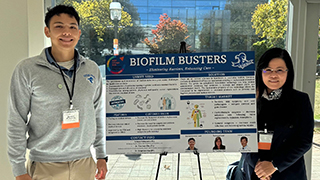Seton Hall Joins National Science Foundation Innovation Corps Northeast Hub
Monday, July 14, 2025

Biology Professor Tinchun “Tina” Chu and student James Primerano earned a competitive spot in the NSF I-Corps program last fall with their innovative research.
Seton Hall University has been selected as the first Associate member of the National Science Foundation Innovation Corps (NSF I-Corps) Northeast Hub. This designation places Seton Hall among a select group of institutions committed
to transforming research into real-world solutions through entrepreneurial education.
The I-Corps program, funded by the National Science Foundation, provides researchers
and student teams with hands-on experiential training and funding to explore whether
their innovations have commercial potential. Through the Hub, Seton Hall students
and faculty gain access to entrepreneurship boot camps, including the signature “Propelus”
— a four-session regional training that includes a $1,500 stipend and pairs participants
with mentors from top instructors across partner institutions.
“Joining the I-Corps Northeast Hub represents an exciting step forward for Seton Hall
and our commitment to innovation and entrepreneurship,” said Professor of Finance
Hongfei Frank Tang, Ph.D., who will serve as faculty lead for Seton Hall’s I-Corps program. “This partnership
gives our faculty and students direct access to valuable resources, mentorship, and
national networks which accelerate the translation of research into real-world solutions.
This program also fosters collaboration across disciplines and an entrepreneurial
mindset that will serve them long after their time at the University.”
The University’s new Associate member status reflects its strategic commitment to
fostering “impactful, innovative academic programs and research that address societal
challenges,” said Benjamin Lowe, M.B.A., a faculty member in the Stillman School of Business. He will serve as co-director
of Seton Hall’s I-Corps program with Susan Scherreik, M.B.A., founding director of the Center of Innovation and Entrepreneurship.
“Seton Hall is dedicated to transforming great ideas into tangible, real-world impact,”
he said. “In developing our strategic vision, we sought to align our efforts with
the visionary leadership of St. Elizabeth Ann Seton — promoting innovation that not
only advances knowledge but also serves the common good. The NSF I-Corps program gives
our researchers the tools to explore commercialization opportunities and bring that
vision to life.”
Building on Innovation
Seton Hall’s participation in I-Corps is already making an impact across disciplines.
Faculty and student research teams who have completed the Propelus program are now
applying entrepreneurial training to explore the market potential of their work.
Green Tea as a Weapon Against Antibiotic Resistance
Biology Professor Tinchun Tina Chu, Ph.D., and student researcher James Primerano earned a competitive spot in the NSF
I-Corps program to evaluate the commercial potential of their research on EC16-containing
formulations, derived from green tea. Their project focused on the antibacterial and
antibiofilm properties of novel formulations, particularly in biofilm-forming bacteria
linked to oral health conditions. As part of I-Corps, the team conducted extensive
customer discovery interviews with dentists, nurses, surgeons and other healthcare
professionals to assess the market need for innovative, non-antibiotic treatments.
“Our research is centered on developing alternatives to conventional antibiotics by
leveraging the antimicrobial properties of green tea compounds,” said Chu. “The I-Corps
experience enabled us to assess the real-world need for such innovations and validated
the translational potential of our work. Speaking directly with healthcare providers
helped us refine our approach and explore future directions for development.”
She added, “Participating in the I-Corps Northeast Regional program last summer was
an invaluable opportunity. It broadened our perspective on impact and deepened our
understanding of stakeholder needs. With Seton Hall now part of the NSF I-Corps Northeast
Hub, I look forward to seeing more faculty and students engage in this meaningful
pathway from academic research to real-world solutions.”
A Smarter, Safer Marine Paint
Professor Sergiu Gorun, Ph.D. in the department of chemistry and biochemistry developed an innovative, environmentally
friendly marine coating. The “smart” paint uses oxygen and sunlight to create a self-cleaning
surface that resists corrosion and pollution. Lowe explored the commercial potential
of the technology through the I-Corps program, conducting customer discovery and assessing
its viability in the multibillion-dollar maritime industry. The project is a standout
example of how Seton Hall’s growing patent portfolio can translate into sustainable,
real-world applications.
Advancing Antifungal Therapies
Ph.D. alumnus Robert Tancer and Charnette Frederic, M.H.A. ’11/Ph.D. ’23, also completed
the I-Corps program mentored by Assistant Professor Gregory Wiedman, Ph.D. Their work focused on a novel antifungal peptide developed in Tancer’s doctoral
research to treat Cryptococcus neoformans, a dangerous and highly drug-resistant pathogen. The team gained direct feedback
from public health officials and healthcare providers, helping to shape their commercialization
path. They also benefited from mentorship through the I-Corps Hub, including guidance
from NSF advisor Michael Craig, Ph.D.
“All these projects are a testament to the quality and creativity of our research
community,” said Scherreik. “By connecting our faculty and students with the I-Corps
Hub, we’re giving them the tools and the network they need to move their innovations
forward.”
A Platform for Growth
As an Associate member, Seton Hall joins a powerful ecosystem that offers extensive
resources for innovators — from Propelus training to mentoring, networking and potential
seed funding, including future grant opportunities. Seton Hall faculty and students
have already participated in sessions hosted by Rutgers, NJIT and Princeton, and will
continue to take advantage of regional opportunities across New Jersey, Pennsylvania,
Delaware and Connecticut.
This fall, the University will host a one-hour information session to introduce the
program to more faculty and students, and to expand participation across disciplines.
“This is a powerful step forward for Seton Hall,” said Scherreik. “Joining this association
of the Northeast region’s most prestigious universities will provide us with abundant
resources and opportunities to further entrepreneurship and accelerate the transition
of federally funded research into commercial ventures. We look forward to fully participating
in this effort, starting with hosting a Novus event this fall.”
Categories: Business, Health and Medicine, Research, Science and Technology






